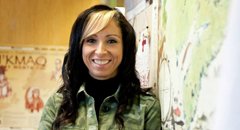Indigenous Canadian Activist to Speak at JSC

Indigenous Canadian Activist to Speak at JSC
Pamela Palmater will speak on indigenous women, murder and the Canadian justice system 7-9 p.m. Monday, Nov. 7.
October 24, 2016
Lawyer, author and social justice activist Pamela Palmater will speak on indigenous women, murder and the Canadian justice system 7-9 p.m. Monday, Nov. 7, at Johnson State College. Her talk, free and open to the public, will be in 207 Bentley Hall.
Palmater, who teaches at Ryerson University in Toronto, is a member of the Eel River Bar First Nation in New Brunswick, Canada. Her talk will focus on the treatment of Canada’s indigenous women, many of whom have been murdered or gone missing in the last decade.
JSC associate professor of political science David Plazek invited her to speak after hearing her address at a conference last year. “When she started talking about these uninvestigated murders and rapes and how the judicial system in Canada was simply ignoring them, I couldn’t believe it,” says Plazek, who directs JSC’s Institute of Canadian Studies.
“Canada was vicious to indigenous people, and they have taken modern steps to show that indigenous issues are on the political agenda,” Plazek says. The women’s murders and disappearances “show they still have a way to go. We in the U.S. need to learn about such issues because we are light years behind Canada.”
Palmater’s blog, “Indigenous Nationhood,” has explored the issue.
In December 2014, “The Inter-American Commission on Human Rights (IACHR) found a direct link between Canada’s discrimination against Indigenous women, their poor socio-economic status and the disproportionate rates of violence they suffer. IACHR concluded that police failures to prevent and protect Indigenous women, and Canada’s failure to address their impoverished socio-economic conditions, both make Indigenous women vulnerable to violence,” according to a blog post.
“In March 2015, the United Nations Committee on the Elimination of Discrimination Against Women issued a report finding Canada guilty of ‘grave violations’ of human rights for Canada’s ‘protracted failure’ to take action on discrimination against Indigenous women, police misconduct, impoverished socio-economic conditions, and inter-generational trauma from colonization, which all make Indigenous women more vulnerable to violence. Again, Canada failed to take any substantive action on the crisis,” according to the same blog post.
The post notes that the Royal Canadian Mounted Police have estimated the number of indigenous women murdered or missing in recent years at nearly 1,200.
For more than 25 years, Palmater has worked on indigenous issues: poverty, housing, education, aboriginal and treaty rights, and others. Her books include “Indigenous Nationhood: Empowering Grassroots Citizens” and “Beyond Blood: Rethinking Indigenous Identity.”
Her research and activism have had an impact. “She’s on TV a lot, so she has been a messenger regarding this,” Plazek says.
The issue may get even more attention now with the change in Canadian prime ministers. The Liberal party’s Justin Trudeau defeated Conservative Stephen Harper in the October 2015 election. “The Harper government was ignoring this issue. Trudeau made it an election promise” to form an investigative committee, Plazek says.
Years ago, the Canadian government made concessions to some indigenous people by creating a new province – Nunavut – from the Northwest Territory for the Inuit people and a permanent seat in Parliament for an indigenous representative. In the U.S., the government should address treaties with Native Americans that it has violated over hundreds of years and listen to tribal leaders about other injustices, Plazek notes.
“We need to put the issue of indigenous people in North America on the agenda writ large,” he says.
“Canada is our closest ally…They’re our largest trading partner,” Plazek says. “We’ve experienced many of the same issues, this being one – indigenous people-government relations. Both countries imperially took and occupied other people’s lands. Canada did it in a much less bloody way than we did. We can learn from one another.”
For more information, visit www.pampalmater.com/.